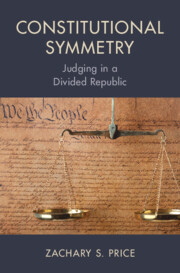2 - The Solution
from Part I - Symmetry Explained
Published online by Cambridge University Press: 14 November 2024
Summary
This chapter advocates an ethic of “symmetric interpretation” as a solution to the challenges outlined in Chapter 1. To prevent undue politicization of constitutional law, judges should favor, when possible, constitutional understandings that are “symmetric” in the sense of conferring valuable protections across both sides of the nation’s major political and ideological divides. By the same token, they should disfavor understandings that frame constitutional law as a matter of zero-sum competition between rival partisan visions. Favoring symmetric understandings in this sense will not always be possible. When it is possible, however, favoring symmetry may provide a point of common orientation for judges with differing policy preferences and interpretive outlooks. Reflecting this approach's inherent appeal, an inchoate preference for symmetry is already evident in judges’ opinions, oral argument questions, and reasoning.
Keywords
- Type
- Chapter
- Information
- Constitutional SymmetryJudging in a Divided Republic, pp. 35 - 52Publisher: Cambridge University PressPrint publication year: 2024

